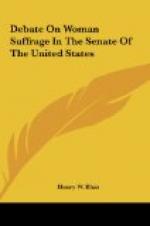It is sometimes, too, urged against this movement for the submission of a resolution for a national constitutional amendment that women should go to the States and fight it out there. But we did not send the colored man to the States. No other amendment touching the general national interest is left to be fought out by individual action in the individual States. Under the terms of the Constitution itself the people of the United States, having some universal common interest affected by law or by the want of law, are invited to come to this body and try here their question of right, or at all events through the agency of Congress to submit that proposition to the people at large in order that in the general national forum it may receive discussion, and by the action of three-fourths of the States, if favorable, their idea may be incorporated in the fundamental law.
I will not detain the Senate further in the discussion of this subject.
It should be borne in mind that the proposition is to submit to men the question whether woman shall vote. The jury will certainly not be prejudiced in her favor as against the public good. There can be no danger of a verdict in her favor contrary to the evidence in the case.
We ask only for her an opportunity to bring her suit in the great court for the amendment of fundamental law. It is impossible for any right mind to escape the impression of solemn responsibility which attaches to our decision. Ridicule and wit of whatever quality are here as much out of place as in the debates upon the Declaration of Independence. We are affirming or denying the right of petition which by all law belongs as much to women as to men. Millions of women and thousands of men in our own country demand that she at least have the opportunity to be heard. Hear, even if you strike.
The lamented Anthony, so long the object of reverence, affection, and pride in this body, among the last acts of his public life, in signing the favorable report of this resolution, made the following declaration:
The Constitution is wisely conservative in the provision of its own amendment. It is eminently proper that whenever a large number of the people have indicated a desire for an amendment the judgment of the amending power should be consulted. In view of the extensive agitation of the question of woman suffrage, and the numerous and respectable petitions that have been presented to Congress in its support, I unite with the committee in recommending that the proposed amendment be submitted to the States.
H.B. Anthony.




